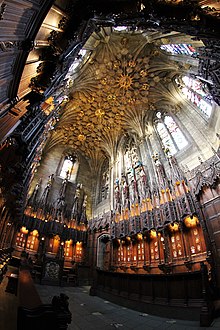
The Thistle Chapel, located in St Giles' Cathedral, Edinburgh, Scotland, is the chapel of the Order of the Thistle.
At the foundation of the Order of the Thistle in 1687, James VII ordered Holyrood Abbey be fitted out as a chapel for the Knights. At James' deposition the following year, a mob destroyed the Chapel's interior before the Knights ever met there. In the 19th and early 20th centuries, multiple proposals were made either to refurbish Holyrood Abbey for the Order of the Thistle or to create a chapel within St Giles' Cathedral. In 1906, after the sons Ronald Leslie-Melville, 11th Earl of Leven donated £24,000 from their late father's estate, Edward VII ordered a new Chapel to be constructed on the south side of St Giles'.
The Trustees appointed by the King to oversee the Chapel's construction appointed Robert Lorimer as architect. The Trustees insisted the choice of craftspeople should reflect the national character of the Chapel. Lorimer assembled a team of leading figures in the Scottish Arts and Crafts movement, including Phoebe Anna Traquair for enamelwork, Douglas Strachan for stained glass, Joseph Hayes for ornate stonework (and much of the woodwork), and the brothers William and Alexander Clow for other woodwork. Louis Davis – who supplied stained glass – and the Bromsgrove Guild – who supplied bronze fittings – were the only major contributors based outside Scotland. Construction began in November 1909 and the Chapel was completed a little over a year later. After its official opening in July 1911, George V knighted Lorimer for his work. Through the continuing addition of stall plates, crests, and banners for new Knights, the Chapel's tradition of craftsmanship persists to the present day. The Knights of the Thistle meet in the Chapel at least once a year.
Architectural critics have noted Lorimer's successful use of a limited site to create a soaring work of Gothic architecture, rich with architectural details. A number of critics have emphasised the Chapel's importance as a product of the Arts and Crafts movement, in which the collaborative craftsmanship of individual artisans defines the overall effect. Some critics have also emphasised the Chapel's political role as an expression of Scottish patriotism, British imperialism, and monarchism.